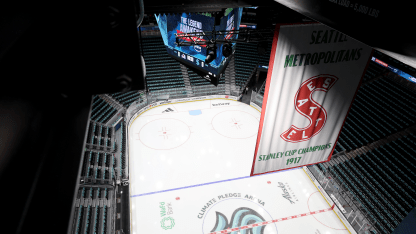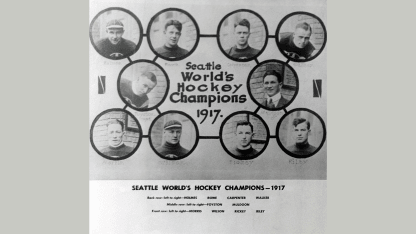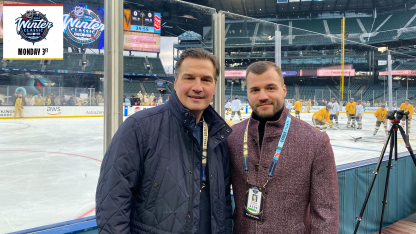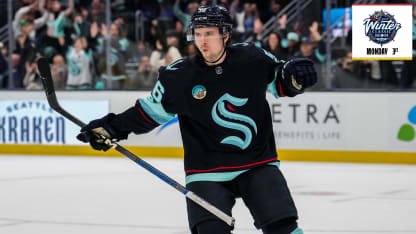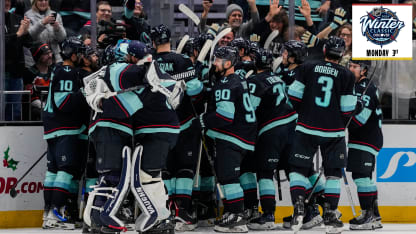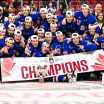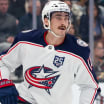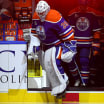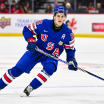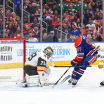What the Seattle Kraken have done in their two-plus seasons in the NHL has been nothing short of amazing.
Sold-out games in a brand-new Climate Pledge Arena, a berth in the Stanley Cup playoffs in their second season, an upset of the Stanley Cup champion Colorado Avalanche that same postseason, and now, serving as host of the 2024 Discover NHL Winter Classic against the defending champion Vegas Golden Knights at T-Mobile Park on Monday (3 p.m. ET; MAX, TruTV, TNT, SN, TVAS).
Those accolades are good for the Kraken because they have an amazing legacy to match. The professional hockey team that proceeded them in this city, the Metropolitans, had a short, but highly successful run in the Emerald City.
They brought hockey to the region, made it popular and, most importantly, became the first United States-based team to win the Stanley Cup, beating the mighty Montreal Canadiens in 1917 in one of the biggest upsets the sport has known.
“Walt Disney couldn’t have scripted it any better,” said Kevin Ticen, the author of “When it Mattered Most: The Forgotten Story of America’s First Stanley Cup, and the War to End All Wars,” a definitive history of the Seattle Metropolitans. “It was a wonderful, crazy story.”
The tale of the Metropolitans, as compelling as it is, was being lost into the fog of history before the Kraken came along and shed new light on the Hollywood-like run of their predecessors as the toast of the town when hockey was a novelty here.
The Metropolitans arrived as the perfect representation of a vibrant city trying to find its footing as one of the hubs on the West Coast. Seattle was a city going through a boon, growing in area and population faster than anyone could imagine.
“You have this city trying to insert itself on the national stage and prove it belongs with the bigger, older Eastern cities,” Ticen said.
The legendary Patrick family saw Seattle as a perfect expansion location to become part of the fledgling Pacific Coast Hockey Association and give the city another arena in which to prove its worth.
Sound familiar? It’s akin to the story the Kraken are authoring since being accepted as the NHL’s 32nd team in 2018 and playing their first game in the 2021-22 NHL season.
Since joining the league, the Kraken have embraced their links to the Metropolitans.
Prior to their second home game -- against the Canadiens, no less -- they raised the banner the Metropolitans earned to the rafters at Climate Pledge Arena. It was part of a pomp-and-circumstance ceremony that incorporated relatives of some of the stars of the Stanley Cup team and made a clear statement that the Kraken were not appropriating the history of the Metropolitans, but rather amplifying it.
"I think it's important for our fans to know you guys can be amazing hockey fans because you have been," Jonny Greco, senior vice president of game presentation and live entertainment, said at the time. "That lineage is in this market already. It's in the fiber of the society here. It's been here for a while. This isn't new. This is just … It's returned home."
For Ticen, who knows the story as well as anyone, the amplification is important. The Metropolitans set the standard for not only the Kraken, but the professional teams, regardless of sport, that have followed.
“The Metropolitans are the tap root for our community and our sports heritage,” he said. “The way the Metropolitans played and competed is how our teams in the city now play and compete.”
So, how did the Metropolitans play?
“Fast, hard and without fear,” says Ticen.
Frank and Lester Patrick arrived in the Pacific Northwest from Montreal to run the family’s lumber interests. Hockey was in their blood, and they set about introducing the sport to the area, forming the PCHA in 1911 to take on the more established National Hockey Association, which had been founded two seasons earlier.
Seattle joined as an expansion team for the 1915-16 season. By then, the league was established and full of star players, many poached from the NHA with big-money offers. The Metropolitans played at the brand-new Seattle Arena, the first artificial-ice rink in the city.
That first season, Pete Muldoon served as the coach for a competitive squad that finished in a tie for second with the Vancouver Millionaires. Forwards Frank Foyston and Jack Walker and goalie Harry Holmes -- each on his way to the Hockey Hall of Fame -- starred, piquing the interest of the city’s populace.
While the spark was lit in that season, it became a full-blown inferno in 1916-17, when the Metropolitans shocked the world.
